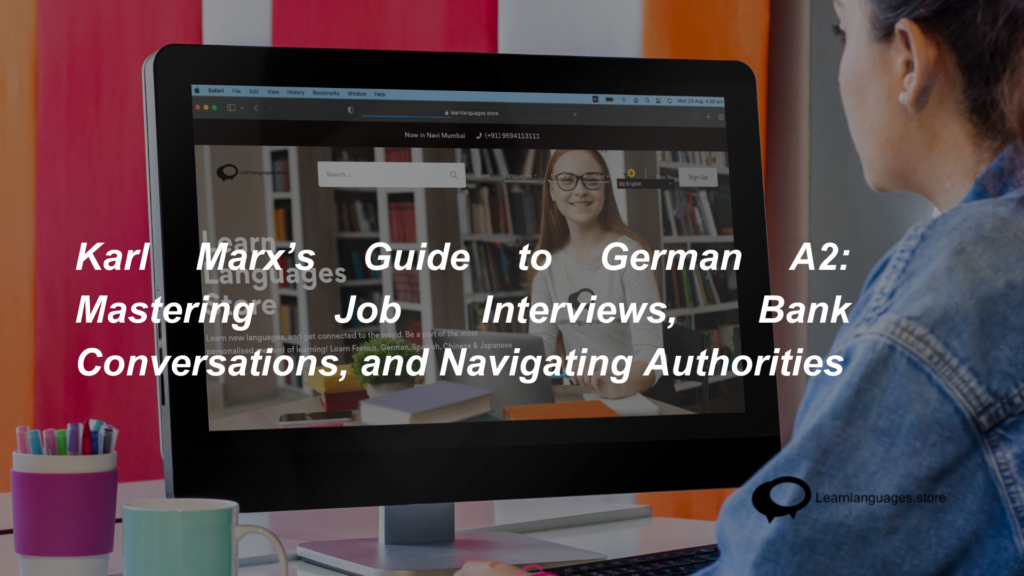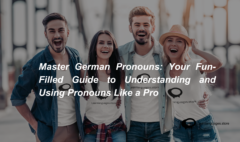Karl Marx’s Guide to German A2: Mastering Job Interviews, Bank Conversations, and Navigating Authorities
Karl Marx’s Guide to German A2: Mastering Job Interviews, Bank Conversations, and Navigating Authorities
Estimated reading time: 13 minutes
Introduction
Comrades, as you embark on your journey to learn the German language, it is not merely a linguistic endeavor but a pathway to understanding the intricate social structures that govern everyday life. In this blog, we shall delve into the nuances of mastering German at the A2 level, focusing on the essential topics of job interviews (Vorstellungsgespräch), interactions at banks (Bankgespräche), and navigating through the labyrinth of bureaucratic authorities (Behörden).
The struggle of the working class has always involved the need to communicate effectively, whether it be with potential employers, financial institutions, or government bodies. Therefore, mastering these interactions in German is crucial for any comrade wishing to fully integrate and thrive in the society.

Vorstellungsgespräch: Understanding Job Interviews
The job interview, or “Vorstellungsgespräch” in German, is a critical step in securing employment. It is a formal interaction where the power dynamics between the employer and the worker are clearly on display. Understanding the language and the cultural nuances of this setting is essential.
Key Aspects of a Job Interview:
- Preparation (Vorbereitung):
- Before the interview, research the company (das Unternehmen) and prepare to answer questions about your qualifications (Qualifikationen).
- Example: “Ich habe meine Qualifikationen gut vorbereitet, um für diese Stelle geeignet zu sein.”
Pronunciation: “Ik haabe may-ne Kvah-li-fee-kah-tsio-nen goot fohr-buh-ray-tet, oom für dee-suh Shtelle gee-ayg-net tsoo zine.”
Translation: “I have prepared my qualifications well to be suitable for this position.”
- Self-Introduction (Selbstvorstellung):
- Introduce yourself clearly and confidently, highlighting your skills and experiences.
- Example: “Mein Name ist Karl Marx, und ich habe Erfahrung im Bereich der politischen Ökonomie.”
Pronunciation: “Mine Nah-meh ist Karl Marks, oond ikh haabe Erfah-roong im Be-raykh der po-lee-ti-shen ö-ko-no-mee.”
Translation: “My name is Karl Marx, and I have experience in the field of political economy.”
- Discussing Strengths and Weaknesses (Stärken und Schwächen):
- Be honest about your strengths (Stärken) and weaknesses (Schwächen), but always frame them positively.
- Example: “Meine Stärke ist die Analyse von Strukturen, aber ich arbeite daran, meine Präsentationsfähigkeiten zu verbessern.”
Pronunciation: “Mine Shter-keh ist dee A-na-lee-ze fon Struk-turen, aber ikh ar-bye-teh dar-an, mine Pre-zent-tsyo-ns-fee-gai-li-kigh-ten tsoo fer-bes-sern.”
Translation: “My strength is the analysis of structures, but I am working on improving my presentation skills.”
- Answering Common Interview Questions:
- Example: “Warum möchten Sie bei uns arbeiten?” (Why do you want to work with us?)
- Example Answer: “Ich sehe in Ihrem Unternehmen die Möglichkeit, meine Fähigkeiten im sozialen Bereich weiterzuentwickeln.”
Pronunciation: “Ik zeh-eh in Ee-rem Oon-ter-neh-men dee Mög-likh-kite, mine Feh-gai-li-kigh-ten im so-tsi-al-en Be-raykh vy-ter-tsu-en-tvik-keln.”
Translation: “I see in your company the opportunity to further develop my skills in the social field.”
- Example: “Könnten Sie mir bitte mehr über die Arbeitszeiten erzählen?”
Pronunciation: “Kön-ten Zee meer bi-te mehr über dee Ar-baits-tsigh-ten er-tse-len?”
Translation: “Could you please tell me more about the working hours?”
Cultural Note: The Role of Hierarchies in German Workplaces
In Germany, the workplace is often structured with clear hierarchies. It is important to address superiors with the appropriate level of formality. Titles and surnames are commonly used, and the use of “Sie” (the formal “you”) is expected until invited to use “du” (the informal “you”). Understanding and respecting these cultural norms will help you navigate job interviews and workplace interactions successfully.
-
Product on sale
 German B1
German B1₹32,600.00
₹42,600.00 -
Product on sale
 German A2
German A2₹24,300.00
₹32,600.00
Bankgespräche: Conversations at the Bank
Interacting with financial institutions is another crucial aspect of daily life. Whether you are opening a bank account, discussing a loan, or simply managing your finances, knowing the appropriate vocabulary and phrases is essential.
Key Aspects of Bank Conversations:
- Opening a Bank Account (Ein Konto eröffnen):
- Example: “Ich möchte ein Girokonto eröffnen.”
Pronunciation: “Ik mökh-teh ayn Jee-ro-kon-to er-öff-nen.”
Translation: “I would like to open a checking account.”
- Asking About Services:
- Example: “Welche Dienstleistungen bieten Sie an?”
Pronunciation: “Vel-kheh Deenst-lai-stoon-gen bee-ten Zee an?”
Translation: “What services do you offer?”
- Discussing a Loan (Ein Darlehen besprechen):
- Example: “Ich interessiere mich für ein Darlehen, um ein Haus zu kaufen.”
Pronunciation: “Ik in-te-res-see-reh mikh für ayn Dar-lehen, oom ayn Hows tsoo kow-fen.”
Translation: “I am interested in a loan to buy a house.”
- Polite Requests at the Bank:
- Example: “Könnten Sie mir bitte die aktuellen Zinssätze nennen?”
Pronunciation: “Kön-ten Zee meer bi-teh dee ak-too-elleh Zins-sät-seh nen-nen?”
Translation: “Could you please tell me the current interest rates?”
- Closing a Bank Account (Ein Konto schließen):
- Example: “Ich möchte mein Konto schließen.”
Pronunciation: “Ik mökh-teh mine Kon-toh shlee-sen.”
Translation: “I would like to close my account.”
Cultural Note: The Importance of Punctuality and Formality
When dealing with banks in Germany, punctuality and formality are paramount. Appointments are often required, and it is important to arrive on time. The use of “Sie” is expected in all interactions, and a formal tone should be maintained throughout the conversation. Germans appreciate directness combined with politeness, so ensure that your requests and questions are clear and concise.
Behördengänge: Navigating Authorities
Dealing with government authorities (Behörden) can be daunting, especially in a country known for its bureaucracy. Whether you are registering your residence, applying for a visa, or filing taxes, knowing how to communicate effectively with officials is crucial.
Key Aspects of Conversations with Authorities:
- Registering Your Residence (Anmeldung):
- Example: “Ich möchte meinen Wohnsitz anmelden.”
Pronunciation: “Ik mökh-teh mine-en Vohn-sits an-mel-den.”
Translation: “I would like to register my residence.”
- Applying for a Visa (Ein Visum beantragen):
- Example: “Ich möchte ein Visum beantragen.”
Pronunciation: “Ik mökh-teh ayn Vee-zoom be-an-trah-gen.”
Translation: “I would like to apply for a visa.”
- Inquiring About a Process (Nach einem Prozess fragen):
- Example: “Könnten Sie mir bitte den Ablauf erklären?”
Pronunciation: “Kön-ten Zee meer bi-teh den Ab-louf er-klären?”
Translation: “Could you please explain the process to me?”
- Filing Taxes (Steuern zahlen):
- Example: “Ich muss meine Steuern zahlen.”
Pronunciation: “Ik moos mine Steu-ern zah-len.”
Translation: “I have to pay my taxes.”
- Polite Requests During a City Tour:
- Example: “Könnten Sie mir bitte etwas über die Geschichte der Stadt erzählen?”
Pronunciation: “Kön-ten Zee meer bi-teh et-vas über dee Geh-shik-teh der Shtat er-tsay-len?”
Translation: “Could you please tell me something about the history of the city?”
- Example: “Könnten Sie mir bitte etwas über die Geschichte der Stadt erzählen?”
Cultural Note: The Network WG and City Tours
In Germany, the “WG” or “Wohngemeinschaft” is a popular living arrangement, especially in cities. This shared living concept is common among students and young professionals, offering an affordable and communal way to experience urban life. When on a city tour, you might learn about the history and significance of various neighborhoods, including those where WGs are prevalent. City tours in Germany are not just about sightseeing; they are an educational experience, often rich with historical and cultural insights.
Vocabulary Lists
Topic: Stadt (City)
- das Wahrzeichen – landmark
Example: “Der Kölner Dom ist ein bekanntes Wahrzeichen.”
Pronunciation: “Der Köhl-ner Dom ist ayn be-kant-es Vahr-tsigh-khen.”
Translation: “The Cologne Cathedral is a famous landmark.” - die Sehenswürdigkeit – tourist attraction
Example: “Die Altstadt ist voller Sehenswürdigkeiten.”
Pronunciation: “Dee Ahlts-shtat ist foll-er Seh-ens-vür-dik-kigh-ten.”
Translation: “The old town is full of tourist attractions.” - der Park – park
Example: “Der Park ist ein schöner Ort zum Entspannen.”
Pronunciation: “Der Park ist ayn schö-ner Ort tsoom Ent-shpan-nen.”
Translation: “The park is a nice place to relax.” - das Museum – museum
Example: “Ich besuche gerne Museen in neuen Städten.”
Pronunciation: “Ik be-sook-heh gern-eh Moo-zeh-en in noy-en Shtet-ten.”
Translation: “I like to visit museums in new cities.” - das Denkmal – monument
Example: “Das Denkmal erinnert an die Opfer des Krieges.”
Pronunciation: “Das Denk-mal er-in-nert an dee Oop-fer des Kreeg-es.”
Translation: “The monument commemorates the victims of the war.” - die Stadtführung – city tour
Example: “Die Stadtführung war sehr informativ.”
Pronunciation: “Dee Shtat-führ-oong var zair in-for-mah-teev.”
Translation: “The city tour was very informative.” - der Platz – square
Example: “Der Marktplatz ist das Herz der Stadt.”
Pronunciation: “Der Marktz-platz ist das Hert-ts der Shtat.”
Translation: “The marketplace is the heart of the city.” - die Straße – street
Example: “Diese Straße ist sehr belebt.”
Pronunciation: “Dee-ze Shtrah-seh ist zair beh-lebt.”
Translation: “This street is very busy.” - das Gebäude – building
Example: “Das alte Gebäude wurde renoviert.”
Pronunciation: “Das al-teh Geh-boy-deh vohr-deh re-no-vee-ert.”
Translation: “The old building was renovated.” - die Kirche – church
Example: “Die Kirche im Zentrum ist sehr alt.”
Pronunciation: “Dee Keer-kheh im Tsen-troom ist zair alt.”
Translation: “The church in the center is very old.”
Topic: Bewerbungsgespräch (Job Interview)
- das Vorstellungsgespräch – job interview
Example: “Ich habe morgen ein Vorstellungsgespräch.”
Pronunciation: “Ik haabe mor-gen ayn Fohr-shtel-loong-ges-praykh.”
Translation: “I have a job interview tomorrow.” - die Bewerbung – application
Example: “Meine Bewerbung wurde akzeptiert.”
Pronunciation: “Mineh Be-wer-boong vohr-deh ak-tsep-teert.”
Translation: “My application was accepted.” - der Lebenslauf – résumé
Example: “Ich habe meinen Lebenslauf aktualisiert.”
Pronunciation: “Ik haabe mine-en Lay-bens-lauf ak-too-al-i-zirt.”
Translation: “I updated my résumé.” - die Qualifikation – qualification
Example: “Welche Qualifikationen bringen Sie mit?”
Pronunciation: “Vel-kheh Kva-lee-fee-kah-tsio-nen brin-gen Zee mit?”
Translation: “What qualifications do you have?” - das Gehalt – salary
Example: “Das Gehalt ist ein wichtiger Faktor.”
Pronunciation: “Das Ge-halt ist ayn vikh-tik-er Fak-tor.”
Translation: “The salary is an important factor.” - die Erfahrung – experience
Example: “Ich habe viel Erfahrung in diesem Bereich.”
Pronunciation: “Ik haabe feel Erfah-roong in dee-sem Be-raykh.”
Translation: “I have a lot of experience in this field.” - die Stärke – strength
Example: “Meine Stärke ist Teamarbeit.”
Pronunciation: “Mineh Shter-keh ist Team-ar-bite.”
Translation: “My strength is teamwork.” - die Schwäche – weakness
Example: “Meine Schwäche ist, dass ich manchmal ungeduldig bin.”
Pronunciation: “Mineh Shveh-kheh ist, dass ikh mankh-mal oon-ge-dool-dikh bin.”
Translation: “My weakness is that I am sometimes impatient.” - der Arbeitgeber – employer
Example: “Der Arbeitgeber hat gute Bewertungen.”
Pronunciation: “Der Ar-byt-gay-ber haat goot-eh Be-ver-toon-gen.”
Translation: “The employer has good reviews.” - der Arbeitsplatz – workplace
Example: “Der Arbeitsplatz ist sehr modern.”
Pronunciation: “Der Ar-byt-splatz ist zair mo-dairn.”
Translation: “The workplace is very modern.”
Topic: Bank (Bank)
- das Konto – account
Example: “Ich möchte ein Konto eröffnen.”
Pronunciation: “Ik mökh-teh ayn Kon-to er-öff-nen.”
Translation: “I would like to open an account.” - der Zinssatz – interest rate
Example: “Der Zinssatz ist derzeit sehr niedrig.”
Pronunciation: “Der Zins-satz ist dair-tsait zair neek-rikh.”
Translation: “The interest rate is currently very low.” - die Überweisung – transfer
Example: “Ich habe eine Überweisung gemacht.”
Pronunciation: “Ik haabe eye-neh Über-vai-zoong ge-makht.”
Translation: “I made a transfer.” - die Filiale – branch
Example: “Die Filiale befindet sich in der Innenstadt.”
Pronunciation: “Dee Fee-lee-ah-leh beh-fin-det zikh in der In-en-shtadt.”
Translation: “The branch is located in the city center.” - der Kredit – loan
Example: “Ich habe einen Kredit aufgenommen.”
Pronunciation: “Ik haabe eye-nen Kreh-deet owf-ge-nom-men.”
Translation: “I took out a loan.” - die Einzahlung – deposit
Example: “Ich möchte eine Einzahlung machen.”
Pronunciation: “Ik mökh-teh eye-neh Ein-tsigh-loong makhen.”
Translation: “I would like to make a deposit.” - die Abhebung – withdrawal
Example: “Ich habe eine Abhebung gemacht.”
Pronunciation: “Ik haabe eye-neh Ab-heh-boong ge-makht.”
Translation: “I made a withdrawal.” - der Kontoauszug – account statement
Example: “Ich brauche einen aktuellen Kontoauszug.”
Pronunciation: “Ik brow-kheh eye-nen ak-too-elle-en Kon-toh-ows-tsook.”
Translation: “I need a current account statement.” - die Bankkarte – bank card
Example: “Ich habe meine Bankkarte verloren.”
Pronunciation: “Ik haabe mineh Bank-kar-teh fer-lo-ren.”
Translation: “I lost my bank card.” - die Gebühren – fees
Example: “Welche Gebühren fallen an?”
Pronunciation: “Vel-kheh Geh-bühr-en fal-len an?”
Translation: “What fees apply?”
Topic: Behörde (Authority)
- die Anmeldung – registration
Example: “Ich muss meine Anmeldung beim Bürgeramt machen.”
Pronunciation: “Ik moos mineh An-mel-doong bym Bür-ger-ahmt makhen.”
Translation: “I need to do my registration at the citizen’s office.” - der Antrag – application
Example: “Ich habe einen Antrag auf Visum gestellt.”
Pronunciation: “Ik haabe eye-nen An-trag owf Vee-zoom ge-shtelt.”
Translation: “I have submitted an application for a visa.” - die Behörde – authority
Example: “Ich muss zur Behörde gehen, um meinen Pass abzuholen.”
Pronunciation: “Ik moos tsoor Beh-ör-deh geh-en, oom mine-en Pass ab-tsoo-ho-len.”
Translation: “I have to go to the authority to pick up my passport.” - das Formular – form
Example: “Bitte füllen Sie dieses Formular aus.”
Pronunciation: “Bi-teh fülen Zee dee-zes For-moo-lahr ows.”
Translation: “Please fill out this form.” - die Bescheinigung – certificate
Example: “Ich brauche eine Bescheinigung für meinen Arbeitgeber.”
Pronunciation: “Ik brow-kheh eye-neh Beh-shigh-nig-oong für mine-en Ar-byt-gay-ber.”
Translation: “I need a certificate for my employer.” - die Gebühr – fee
Example: “Welche Gebühr muss ich zahlen?”
Pronunciation: “Vel-kheh Geh-bühr moos ikh zah-len?”
Translation: “What fee do I have to pay?” - die Frist – deadline
Example: “Die Frist für die Anmeldung ist nächste Woche.”
Pronunciation: “Dee Frist für dee An-mel-doong ist näch-steh Voh-kheh.”
Translation: “The deadline for registration is next week.” - das Dokument – document
Example: “Ich habe alle notwendigen Dokumente dabei.”
Pronunciation: “Ik haabe alle noht-vendigen Doh-koo-men-teh da-by.”
Translation: “I have all the necessary documents with me.” - die Genehmigung – permission
Example: “Ich brauche eine Genehmigung, um hier zu arbeiten.”
Pronunciation: “Ik brow-kheh eye-neh Geh-nay-mee-goong, oom heer tsoo ar-bye-ten.”
Translation: “I need permission to work here.” - die Wartezeit – waiting time
Example: “Die Wartezeit beträgt etwa zwei Stunden.”
Pronunciation: “Dee Var-teh-tsight beh-trägt et-vah tsvy Shtoon-den.”
Translation: “The waiting time is about two hours.”
Enhance Your German Skills!
To improve your German further, consider enrolling in our A1 Level German Course at Learn Languages Store for just Rs. 16,300. Our courses are designed to help you build a strong foundation in the German language in a fun and engaging way.
Contact Us to Learn More!
For more information about our courses, feel free to reach out to us at:
Address:
330, 3rd Floor, Big Splash (Near Vashi Bus Depot),
Sector 17, Vashi,
Navi Mumbai, Maharashtra 400703
Phone: +91-9594113111
Email: services@learnlanguages.store
Don’t miss the opportunity to enhance your language skills! Sign up today and start your journey to fluency in German!
Conclusion
Comrades, as you traverse the landscape of the German language, remember that it is not just about words and grammar, but about understanding the social fabric in which these interactions take place. Whether you are engaging in a job interview, opening a bank account, or navigating the complex bureaucracy, your ability to communicate effectively in German will empower you in your daily life.
As Karl Marx might have observed, language is a tool of both personal and social transformation. By mastering these essential phrases and understanding the cultural context, you not only improve your ability to navigate German society but also enrich your own experience within it.
Continue to study diligently, and soon you will find that these interactions become second nature. Viel Erfolg! (Much success!)










